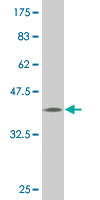PCDH1 Antibody (monoclonal) (M05)
Mouse monoclonal antibody raised against a partial recombinant PCDH1.
- 产品详情
- 实验流程
- 背景知识
Application
| WB |
|---|---|
| Primary Accession | Q08174 |
| Other Accession | NM_002587 |
| Reactivity | Human |
| Host | mouse |
| Clonality | monoclonal |
| Isotype | IgG2b Kappa |
| Clone Names | 2A11 |
| Calculated MW | 114743 Da |
| Gene ID | 5097 |
|---|---|
| Other Names | Protocadherin-1, Cadherin-like protein 1, Protocadherin-42, PC42, PCDH1 |
| Target/Specificity | PCDH1 (NP_002578, 62 a.a. ~ 169 a.a) partial recombinant protein with GST tag. MW of the GST tag alone is 26 KDa. |
| Dilution | WB~~1:500~1000 |
| Format | Clear, colorless solution in phosphate buffered saline, pH 7.2 . |
| Storage | Store at -20°C or lower. Aliquot to avoid repeated freezing and thawing. |
| Precautions | PCDH1 Antibody (monoclonal) (M05) is for research use only and not for use in diagnostic or therapeutic procedures. |
For Research Use Only. Not For Use In Diagnostic Procedures.
Provided below are standard protocols that you may find useful for product applications.
BACKGROUND
This gene belongs to the protocadherin subfamily within the cadherin superfamily. The encoded protein is a membrane protein found at cell-cell boundaries. It is involved in neural cell adhesion, suggesting a possible role in neuronal development. The protein includes an extracelllular region, containing 7 cadherin-like domains, a transmembrane region and a C-terminal cytoplasmic region. Cells expressing the protein showed cell aggregation activity. Alternative splicing occurs in this gene.
REFERENCES
Identification of PCDH1 as a novel susceptibility gene for bronchial hyperresponsiveness. Koppelman GH, et al. Am J Respir Crit Care Med, 2009 Nov 15. PMID 19729670.Signal sequence and keyword trap in silico for selection of full-length human cDNAs encoding secretion or membrane proteins from oligo-capped cDNA libraries. Otsuki T, et al. DNA Res, 2005. PMID 16303743.Immunoaffinity profiling of tyrosine phosphorylation in cancer cells. Rush J, et al. Nat Biotechnol, 2005 Jan. PMID 15592455.Phosphoproteomic analysis of the developing mouse brain. Ballif BA, et al. Mol Cell Proteomics, 2004 Nov. PMID 15345747.Functional proteomics mapping of a human signaling pathway. Colland F, et al. Genome Res, 2004 Jul. PMID 15231748.
终于等到您。ABCEPTA(百远生物)抗体产品。
点击下方“我要评价 ”按钮提交您的反馈信息,您的反馈和评价是我们最宝贵的财富之一,
我们将在1-3个工作日内处理您的反馈信息。
如有疑问,联系:0512-88856768 tech-china@abcepta.com.























 癌症的基本特征包括细胞增殖、血管生成、迁移、凋亡逃避机制和细胞永生等。找到癌症发生过程中这些通路的关键标记物和对应的抗体用于检测至关重要。
癌症的基本特征包括细胞增殖、血管生成、迁移、凋亡逃避机制和细胞永生等。找到癌症发生过程中这些通路的关键标记物和对应的抗体用于检测至关重要。 为您推荐一个泛素化位点预测神器——泛素化分析工具,可以为您的蛋白的泛素化位点作出预测和评分。
为您推荐一个泛素化位点预测神器——泛素化分析工具,可以为您的蛋白的泛素化位点作出预测和评分。 细胞自噬受体图形绘图工具为你的蛋白的细胞受体结合位点作出预测和评分,识别结合到自噬通路中的蛋白是非常重要的,便于让我们理解自噬在正常生理、病理过程中的作用,如发育、细胞分化、神经退化性疾病、压力条件下、感染和癌症。
细胞自噬受体图形绘图工具为你的蛋白的细胞受体结合位点作出预测和评分,识别结合到自噬通路中的蛋白是非常重要的,便于让我们理解自噬在正常生理、病理过程中的作用,如发育、细胞分化、神经退化性疾病、压力条件下、感染和癌症。






